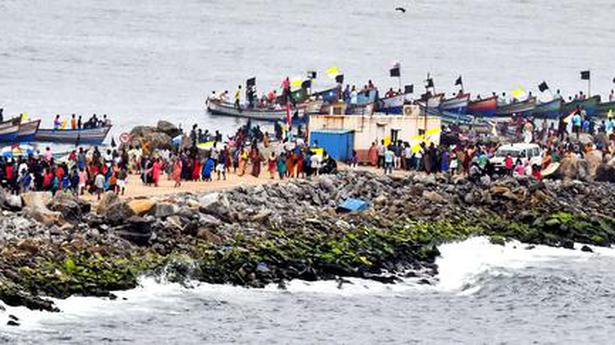Large sections of the fishing community in Thiruvananthapuram believe that the construction of the Vizhinjam port breakwater is to blame for the intensification of coastal erosion, which has led to the disappearance of sandy beaches and livelihood
Large sections of the fishing community in Thiruvananthapuram believe that the construction of the Vizhinjam port breakwater is to blame for the intensification of coastal erosion, which has led to the disappearance of sandy beaches and livelihood
A black flag flutters high on the remains of a groyne extending a few metres out into the sea opposite the imposing bulk of St Thomas Church at Poonthura, a densely populated fishing village on the Thiruvananthapuram coast in Kerala.
The flag, a local fisherman explained on Wednesday, is meant to remind people of the protests under way further south at Vizhinjam against the massive seaport being constructed by the Adani Group. Close by, several fishing boats have been dragged up on the church compound.
“We can’t launch them into the sea from here anymore. There’s no beach left. Coastal erosion is that severe in these parts,” says Nelson, a fisherman.
Down a narrow street hugging the seawall, another fisherman draws attention to his house, whose roof has been tightly wrapped in blue tarpaulin to protect it from the waves. “By the time the construction of the port is over, all of this will vanish,” the fisherman, who identified himself as Benjamin, says, pointing to the line of small houses and shacks next to the seawall.
Firm belief
Large sections of the fishing community here firmly believe that the construction of the port breakwater is to blame for the intensification of coastal erosion, which has led to the disappearance of their sandy beaches and livelihood. They are deeply incensed by the government’s reluctance to accept their argument.
“Chief Minister Pinarayi Vijayan claims that outsiders are behind the agitation. None of them are outsiders. The government has failed to keep its promises to the fishing community,” says another fisherman.
On August 16, under the aegis of a Latin Archdiocese-led action council, the fishing community launched an open agitation outside the port gates at Vizhinjam. Their primary demand: suspend port construction and carry out an impact assessment in consultation with the local people.
Also read: Climate vagaries to blame for coastal erosion: studies
Other demands
Fishers and citizens using their fishing boats lay siege to Adani port
| Photo Credit: PTI
Other demands include rehabilitation packages for the affected families, subsidies on kerosene supplies, minimum wages for the fishermen on days when poor weather forces them to stay home, rectification of design flaws at the Muthalappozhi fisheries harbour and steps for speedy compensation for fishers.
Also read: Muthalapozhy a deathtrap for fishers: Opposition
On August 19, Minister for Fisheries V. Abdurahiman held talks with the church representatives but failed to get them to call off the protest. Eugene Pereira, Vicar General of the Latin Archdiocese of Thiruvananthapuram, afterwards described the talks as ‘fruitful’ while declaring that the protests would continue until the demands were met in full.
At Vizhinjam, fishermen allege that the L-shaped, partly-constructed breakwater has drastically changed wave patterns and brought about subsurface sedimentation, endangering the four-man fishing boats which set out to the sea.
“Several men have already lost their lives in the choppy waters. Before, we were able to make landfall with our eyes closed. Now it’s dangerous even in the daytime,” says Xavier, a 59-year-old who first ventured out to sea at the age of 14. ‘‘There used to be sandy beaches here where we played football,” he says.
Kerosene prices
Soaring kerosene prices are a major source of grievance for the fishermen. They are forced to shell out ₹130 per litre of the fuel, when their counterparts in Tamil Nadu get it for ₹35 or ₹40, they say.
The fishermen at Poonthura explain that every time a boat leaves on a fishing assignment, it requires 50 litres of kerosene. Since the small craft are unable to launch from Poonthura, the fishermen are forced to travel all the way down to the harbour at Vizhinjam with their outboard engines and nets in pick-up autos.
“The up-and-down travel alone costs about ₹2,000. Add to this kerosene and food expenses, you need around ₹9,000 merely to set out to sea,” says Benjamin.






